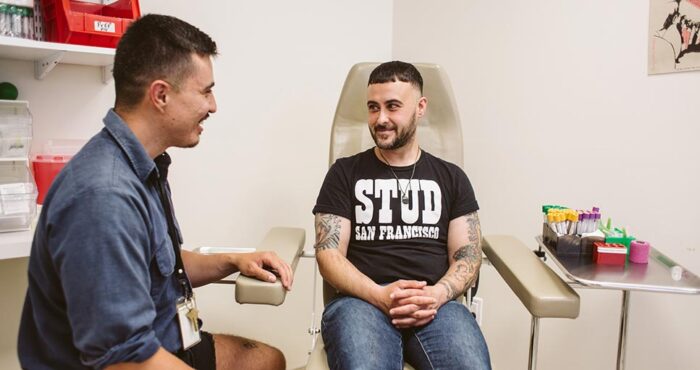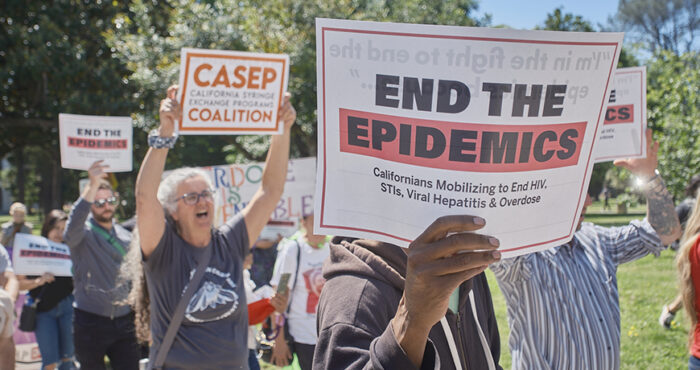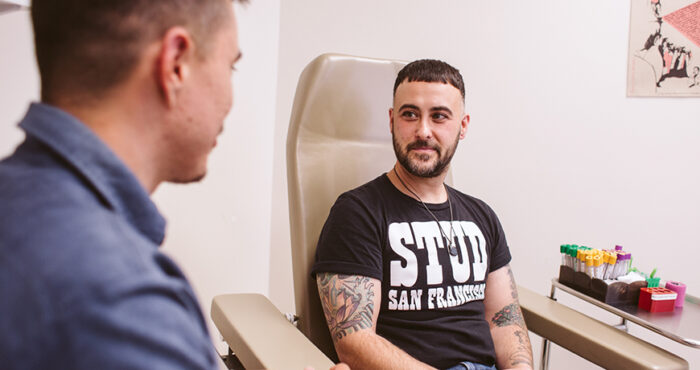New Policies to Improve PrEP Access
As pre-exposure prophylaxis (PrEP) gains acceptance, medical experts and policymakers are finding new ways to make this effective HIV prevention tool accessible to more people who could benefit.
Last month the California Senate passed a bill that will allow pharmacists to provide PrEP and post-exposure prophylaxis (PEP) without a prescription. And in June, the U.S. Preventive Services Task Force (USPSTF) recommended that health care providers offer PrEP to people at risk of acquiring HIV, paving the way for broader insurance coverage.
PrEP at the Pharmacy
SB 159, co-authored by Senator Scott Wiener (D-San Francisco) and Assemblymember Todd Gloria (D-San Diego), authorizes pharmacists to offer a month’s worth of PrEP or a course of PEP without prescription from a physician. It also prohibits insurance companies from requiring prior authorization for PrEP coverage.
On May 21, the Senate approved the bill by a wide 34-to-1 margin, sending it on to the Assembly.
“By allowing pharmacists to furnish these revolutionary medications, we will help reduce HIV infection rates and create a stronger path toward ending new HIV infections entirely,” Wiener said. “We have the tools to end new HIV infections, and we can get there in our lifetime.”
San Francisco AIDS Foundation (SFAF) co-sponsored the bill and was involved in the process of moving it forward, said Courtney Mulhern-Pearson, senior director of policy and strategy.
“The goal of the bill is to make PrEP accessible at a point when people are willing and able to start,” she said. “We’re looking at PrEP uptake and realizing we need to do more to increase access across the state. This is an innovative way to increase access to and awareness of PrEP and to make sure it’s available to all who need it.”
The bill’s current language allows pharmacists to provide a 30-day supply of Truvada (tenofovir disoproxil fumarate/emtricitabine) PrEP to individuals who have had a negative HIV test within the previous seven days. The client would then be referred to a medical provider for the recommended monitoring, including screening for sexually transmitted infections (STIs) and kidney function tests. Pharmacists would also be able to offer a month-long course of PEP, which can prevent HIV infection if started within 72 hours after exposure to HIV.
Some have raised concerns about providing PrEP without testing kidney function in advance, because the tenofovir in Truvada could potentially cause kidney impairment in susceptible individuals. But studies have shown that kidney problems are uncommon among people using Truvada for HIV prevention.
“One month is not going to be a problem,” according to Robert Grant, MD, of the University of California at San Francisco, who led a major study showing that PrEP is highly effective for gay and bisexual men. “We’re not seeing kidney problems very much at all in people seeking PrEP. These typically occur four to five months after starting and they’re rare.”
“We’re only providing PrEP to a small proportion of people who could benefit, and making it more accessible and more convenient at pharmacies will be a step toward stopping HIV transmission,” Grant added.
The Centers for Disease Control and Prevention estimated that less than 10% of the more than 1.1 million people at high risk for acquiring HIV were using PrEP as of 2015. The numbers were even lower for African Americans (1%) and Latinx people (3%), who have high rates of new HIV infections. In California, the state Office of AIDS estimates that as many as 240,000 Californians could be eligible for PrEP, but only around 9,000 people were using it as of late 2016.
“The low rates of PrEP and PEP use across California signal the need to offer these effective prevention tools in additional ways,” said SFAF CEO Joe Hollendoner. “This bill removes unnecessary barriers and streamlines access to PrEP and PEP, so anyone who needs preventative measures can get them.”
USPSTF Recommendation
The new USPSTF recommendation for PrEP carries an “A” grade, meaning it is well-supported by scientific evidence. The Affordable Care Act requires insurers to cover preventive recommended services with an “A” or “B” rating.
“The new recommendation for PrEP is enormously important news for the struggle against HIV,” said Grant. “This grade A recommendation reflects the available evidence, which strongly supports the use of PrEP as a safe, effective method of HIV prevention.”
As described in a June 11 statement in the Journal of the American Medical Association, the recommendation says that clinicians should offer PrEP to sexually active men who have sex with men (MSM) and heterosexual women and men who have an HIV-positive sex partner, do not use condoms consistently, or have had an STI within the past six months. PrEP is also recommended for people who injection drugs who share needles or other injection equipment.
Although few transgender people have been included in trials, PrEP has been shown to reduce the risk of acquiring HIV through receptive or insertive anal or vaginal sex, so it can be considered for cisgender and transgender people alike, according to the authors.
The task force experts recommend once-daily Truvada—currently the only PrEP regimen approved by the Food and Drug Administration—for all at-risk groups. But it also says that tenofovir disiproxil fumarate alone, which is available as an inexpensive generic, is an option for heterosexual men and women and people who inject drugs, based on studies showing that it lowers HIV risk in these groups. No equivalent studies with MSM have been done.
The new recommendation has the potential to substantially expand access to PrEP. Many private insurers already cover Truvada for HIV prevention—which is priced at around $1,600 per month—but cost sharing is common. Gilead Sciences offers a co-pay card that people with private insurance can use to cover out-of-pocket costs, but some claim this benefit is inadequate. Many state Medicaid programs, including California’s, cover PrEP, but this represents a substantial public financial burden given competing funding needs.
Expanding PrEP use among people who need it most will also require raising awareness and combatting stigma.
“PrEP has been proven to be a highly effective intervention in preventing new cases of HIV, and receiving an A grade is an important step towards increased access,” Hollendoner said. “We know, however, that access alone does not result in utilization, so we call on healthcare providers to educate their patients who are at risk for HIV acquisition—especially those who are people of color—about PrEP and how it can protect their sexual health.”










